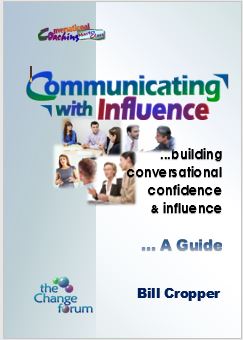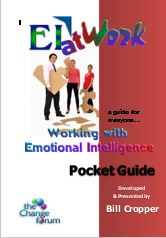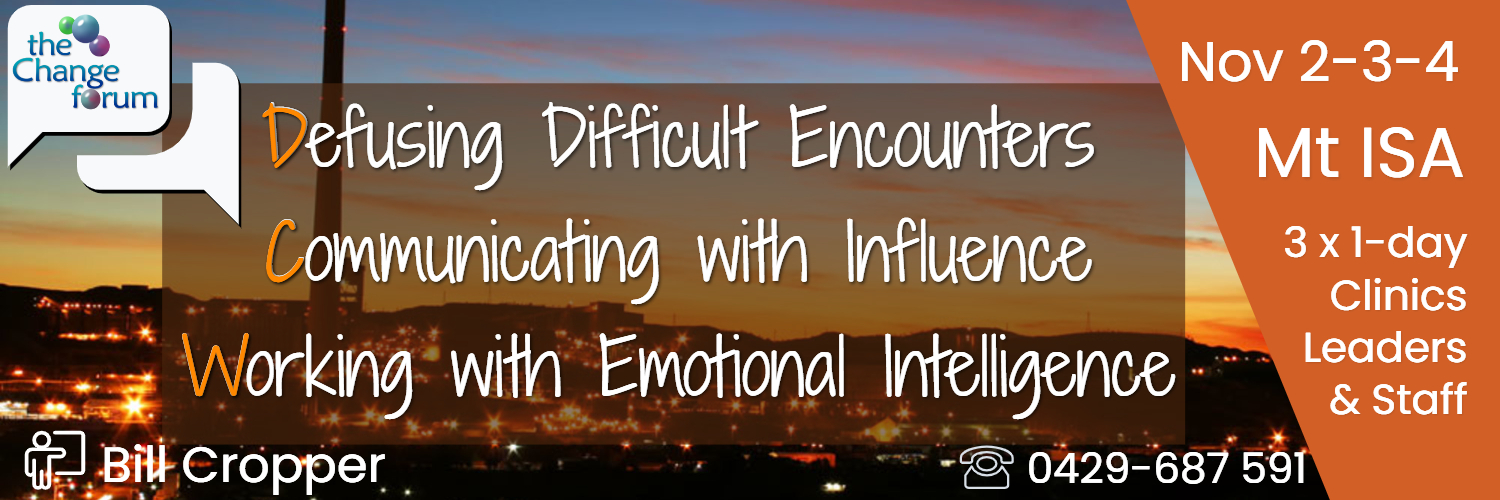MT ISA Spring Series November 2-3-4
3 x 1-day Clinics
with Bill Cropper - The Change Forum
Attend 1, 2 or all 3... Discounts for multiple places or multiple clinics
NOV 2 - Defusing Difficult Encounters
Common-sense pointers, tools and verbal tips to help you hose-down hostile moments
NOV 3 - Communicating with Influence
Bolster your conversational skills to communicate with more influence
NOV 4 - Working with Emotional Intelligence
5 essential EI at Work practices to improve relationships & work in better with others
TIMING: 8.30am-4.30pm each day VENUE: Mt ISA - To be confirmed
Course Descriptions & Registration Details follow
Defusing Difficult Encounters
Common-sense pointers, tools and verbal tips to
help you hose-down hostile moments
As you know from experience, not every situation turns out the way you'd like. Things can turn ugly in seconds, unexpectedly. Even if you can't settle them, resolve the issue constructively or fend off abuse, you can at least work at staying emotionally balanced and calm, try not lose it yourself, and avoid saying or doing anything to escalate their emotions or inflame the situation further.
What's this clinic about?
Whether it’s a hostile parent, agitated customer, worrisome workmate or caustic colleague, navigating touchy situations where conversations get combative, and where one, or both of us, get defensive, argumentative, hostile or aggressive, are often a part of everyday life for us all, no matter how much we wish they weren't
Handled badly or left unresolved to fester, the residual effects of difficult encounters tend to grow and create more chaos around us.
Instead of avoiding them, which is what most of us do, we all need to learn how to deal better with these types of touchy situations.

We all know what a difficult encounter feels like. They come in all shapes but it's any touchy topic or sticky situation where either of us get heated, hostile, belligerent or abusive.
Inflammatory interactions can keep us awake at night in dread of anticipated conflict, going over what we should say or do, what we should have said or done, or regretting what we did say or do!
They make us feel anxious, upset, hurt, terrified, stressed, resentful, silly, awkward, guilty or emotionally vulnerable, intimidated or disrespected.
They can lead us to bubble over with anger and outrage or simmer silently in frustration, We agonise over them, weighing up what we might have said differently to get a better result.
And sometimes, they can land us in hot water because our encounter got complained about – whether we think we handled it well enough, or poorly, is often beside the point
"This is a must-do course I'd definitely recommend. Bill explained things very well, kept us all engaged and facilitated some really useful and open discussions on how we've handled difficult experiences" Matt T, Southern Downs Regional Council
What You'll Learn

Difficult encounters are by nature unpredictable. While there are no set formulas or quick fixes guaranteed to work every time, this course covers some common-sense tools and techniques that we hope can help you defuse and handle them, more calmly, confidently and constructively.
No matter how professional or conversationally competent we are, or what strategies we try, we all have difficult moments when things don’t go ‘right’ - No matter what strategies we try, how professional we are, or what efforts we make to contain or curtail them, things can get heated and can flare up.
The aims of Defusing Difficult Encounters are a bit like first-aid
for difficult experiences
It's to help you and your colleagues:
Understand the dynamics behind what goes on in hostile or touchy encounters
Handle difficult moments arising with agitated, upset, hostile, aggressive people
Learn pointers, tools, verbal formulas and tips to help defuse difficult moments
Raise your confidence to handle difficult moments
Maintain emotional balance and stay in quiet control
Look at handling mistakes we make that may escalate and make things worse

Take-away handy-sized pocket guide full of tools and actions you can tap into to build on what we cover in this session.
Defusing Difficult Encounters
A note to keep in mind...
While we will be looking at situations that are confronting, offensive, provocative, threatening or hostile, we won't be dealing with encounters that go from difficult to dangerous. If that happens, get straight out of harm's way and seek assistance if things get ugly, violence is threatened, dangerous acts occur or are imminent, or you feel personally at risk in any way.
-- Come along with your teammates & learn together –-
Discounts for multiple places and multiple clinics
Spring Discounts & In-house options
Attend with 2 friends or
Attend 2 or more clinics ... and save
Spring discounts for 3 or more attending together or if 1 person attends multiple clinics in this series
Regular discounts for Not-for-profit organisations and schools
In-house Delivery always available
for larger groups, tailored clinics and unscheduled locations Call BILL CROPPER 0429-687 513 or Enquire online
Subscribe for News, Articles, Resources & Offers
Keep up-to-date with latest articles, free resource offers and occasional special discounts
Communicating with Influence
Bolster your conversational skills...
One primal use of conversation has always been to influence or persuade others... In our conversational coaching clinics, one common goal or concern many people have is: How do I persuade people round to my point of view? By this, they usually mean putting their position across in a way that people may be convinced to take up or endorse that proposition – or what’s called advocacy.
It’s as old as human-kind itself. We’ve always tried to influence others – people in positions of power, people we need to follow us, people in our private lives and at work, whose cooperation, agreement or effort we need to succeed. In many team meetings, arguing or debating seems the default. We undermine and detract from other’s views, tenaciously defend our own, get defensive and only listen to judge or criticise rather than to understand others.

What's this clinic about?
Conversations help us connect with each other, understand each other, and build relationships. At the same time, they’re also where we give voice to our views, opinions, our deeper feelings and beliefs.
And of course, we use them to persuade and influence – to talk others round to our way of thinking or at least, get them to understand and consider our point of view too.
While thisis not a course about winning argument, it will benefit those who want to say what they have to say in ways that will make it more likely you will be heard. Communicating with Influence offers practical techniques to raise your conversational confidence; speak with more clarity and influence; and have more effective and satisfying interactions – at work and elsewhere.
We all have a natural need to be heard – to have our say, and have our views and feelings listened-to and understood
Many if not most of us, want to build our conversational confidence and influence – to be more persuasive and assertive in our dealings with others.
In fact, acting assertively in positive ways, can increase our confidence and self-control. It also generally gains respect, increases the chance for honest, open relationships and also helps with engagement and resolving issues together.
Hopefully, we’re also interested in what other people have to say – and want to hear their views and feelings too.
“I just wanted to say how really well-received Bill’s sessions were on Communicating with Influence. Every time I dropped into the sessions, I could see people were attentive and engrossed. And at the end of the sessions, quite a few were telling me even then how really happy they were with the content and with Bill" Elske S, Dept. JAG
What You'll Learn
This 1-day fast-track will benefit you, or anyone else, who has a need to increase their level of persuasiveness, or be more confident and influential in putting across their views. The general aim is to bolster your conversational skills (as much as we can inside the constraints of a short session) to communicate with more influence in areas such as how to:
Use positive strategies for more persuasive and balanced conversations
Advocate respectfully and robustly for a particular point of view
Put your position clearly but also encourage engagement from others
How to respectfully disagree or put an alternative point of view
Practise tools to facilitate more respectful, engaging and connective discussion
Understand triggers for, and impacts of, conflict and challenging behaviours
Deal with difficult meeting moments and maintain engagement
Put propositions persuasively and be more influential
Talk round barriers and get more attention for, and uptake of, your advice
Overcome conversational anxiety improve your level of confidence, influence and persuasion

Take-away personal guide book full of tools and tips to tap into to build on what we cover in this session.
Working with Emotional Intelligence
5 essential EI at Work practices
There’s an emotional revolution going on. It stems from a growing realisation that emotions do matter after all – for good work, good relationships, good leadership, and a good life. Office, factory, work, school or home, emotions affect how we think, how we behave, how well we lead, cope with change and stress, how well we work together and how motivated, satisfied and effective we are.
What's this clinic about?
Emotions may seem minor from a strictly rational business viewpoint, yet they have a real impact in terms of getting work done well, relating well to customers, colleagues, bosses, and creating a positive and productive work climate.
Whether we’re aware of them or not, feelings are pivotal for high-energy teams, constructive work relationships and ‘can-do’ cultures.

They profoundly influence how we behave, how we cope with change, how well we manage workload pressures and how motivated, satisfied and effective we are at work.
The cost of a lack of emotional intelligence is huge in terms of staff turnover, low work output, stress, mistakes and low morale – but they often go unnoticed. We all know when people feel down emotionally, concentration is difficult, the tendency to make mistakes increases, tempers are stretched and work is likely to be less productive than when we feel good and at our best.
EI is indispensable for successful work…
Emotional Intelligence has a lot to do with raising levels of achievement, motivation, goal-focus, optimism, joy, purpose and staff performance – and decreasing dysfunctional behaviour and performance drawbacks like anger, apathy, aggression, anxiety, cynicism, contempt, sullen silence and withdrawal that set off negative emotional chain-reactions and spawn toxic work climates.
“I came along to learn how to manage personal stressors in high-workload environments. I enjoyed the relaxed nature and insights of the small-group conversations and went away with a much better understanding of how to incorporate mindfulness into both work and my private life." Thomas G - Queensland Parks & Wildlife
What You'll Learn
Working with Emotional Intelligence covers various aspects, ranging from personal and team through to the role EI plays in handling personal change, respect and customer service applications. This program covers tools and practices to help people:
Understand what EI is and the impact it has on work ability
Take control of feelings and see how they affect people’s work performance
Manage moods, control negative emotions and see how feelings influence job satisfaction, approaches to work and ability to get along well with other
Deal better with those difficult moments, handle conflict and hostility differently and cope more confidently with stress, pressure and the demands of change
Build emotional self-awareness, better manage critical work situations and improve team relationships

Take-away handy-sized pocket guide full of tools and actions you can tap into to build on what we cover in this session.
“Extremely interesting and challenging! I came thinking I’d just sit through it but by lunchtime I was confronting my demons. I love the Guide too – haven’t been able to put it down. Thanks for opening my eyes and my mind.” Francis D, Queensland Health
Working with Emotional Intelligence
Is this course for you?
This EI clinic targets the people you rely on most – your STAFF! And not just for those people you find difficult or troublesome either. Working people from any walk of life who want to connect better with others, improve their ‘self’-awareness, learn strategies for improving team relationships and increase their own satisfaction with work, can benefit greatly from attending this clinic. Managers and team leaders who are keen to explore EI from a personal perspective rather than leadership will also benefit from coming along.
Down-to-earth, hands-on, stimulating & relevant
Practical tools, processes & frameworks for back-at-work action
Comprehensive, take-away, self-coaching Guidebooks
Safe, relaxed, small-group environment
Highly-experienced, well-regarded facilitator
Serious & challenging with a healthy dose of fun!
Cost & Registration
Special Rates for Mt ISA November '22
Come along with colleagues to save more!
NOV 2: Defusing Difficult Encounters
NOV 3: Communicating with Influence
NOV 4: Working with Emotional Intelligence
Full Value 1 Day clinics $660 per person
SPRING Outback Special...
GENERAL Registration
1 place or clinic: $528 per person
3 or more places or 2 or more Clinics: $473 per person
NFP Organisations & Schools
1 place or clinic: $495 per person
3 or more places or 2 or more Clinics: $462 per person
Note: In-House Clinics recommended for 12 or more
Save for 3 or More Places
or if you attend 2 or more Clinics
The fine print...
Prices include GST… Pay by Card at registration or Invoice for EFT
Payment on invoice within 10 days and prior to attendance
Fees are non-refundable but may be transferred to an alternative event up to 14 days prior
Minimum numbers required at The Change Forum’s discretion
Venue: Mt Isa venue to be confirmed
Inclusions: Tuition, light lunch, refreshments and comprehensive self-coaching Guide
Timing: 8.30 am - 4.30 pm each day (arrive 20 mins prior)

